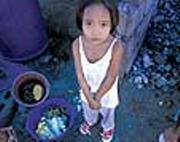
Africa (MNN) — With 5,700 people dying of HIV/AIDS every day, and seven new infections every 7 second, there is bound to be a dramatic effect on children.
Ben Homan of Food for the Hungry says HIV/AIDS infections in children can happen in simple and disturbing ways. "The father of a young boy shaved his son's head with a razor that was infected with the HIV/AIDS virus," he said. "There are inappropriate sexual behaviors and rituals that are still prevalent in Africa that also spread the HIV/AIDS virus among children."
According to Homan, the reality of the pandemic for children is easy to see when "you walk through AIDS-affected communities in Africa, as I have, and you see the local furniture store offering coffins the size that only children can fit in."
Children who are not directly affected by the disease still quite possibly are indirectly affected. They may be orphaned at a young age when their parents die from the
disease. Even if not orphaned, whenever a parent dies from the disease, children are affected because the stigma of HIV/AIDS is projected onto anyone within the family.
Those in entire communities may get stuck in the midst of a food shortage since a majority of field workers are not able to work the fields because of the disease. Children's growth and opportunities are stunted, if not cut off, because of these types of situations.
"It becomes a systemic disaster," said Homan.
It's a systemic disaster that the church, both in Africa and other countries, should stand up and do something about. "We need to have the church be a leader in removing the stigma," Homan said. "Pastors and leaders in the church have a responsibility to speak out."
Homan explained that a church that knows how to pray for and reach out to those affected by HIV/AIDS has a powerful tool to share God's love. He says brokenness is the starting point of the Gospel and a starting point for evangelism. "When you look at HIV/AIDS and you look at the devastation that it brings, it creates very real, very tragic brokenness. In that, there is an opportunity for hope to shine, even in the midst of darkness."
Get more information on how you and your church can get involved and make a difference here. "I believe now is the time for the church in the United States to stand up and say ‘We will be counted, and we will make this a priority. We will pray, we will give, we will advocate, we will be educated, and we will make a difference.'"